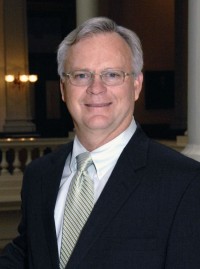The fight over autism treatment coverage continued in a House committee hearing Monday, pitting organizations concerned about costs against those advocating for the most effective services for children.
Senate Bill 1 would require many health insurance plans to cover applied behavior analysis (ABA), a treatment designed to help young children with autism reach their full potential in learning ability.
The issue is contentious. A similar bill was unable to win approval last year, stymied in a standoff between the Senate and the House. And the House Insurance Committee hearing concluded Monday with no vote taken on the bill.
The General Assembly session is expected to end next week.
One in 68 children has been diagnosed with autism nationally, with a Georgia rate of 1 in 64.
Sen. Charlie Bethel (R-Dalton), the legislation’s main sponsor, told the House panel that autism “is a public health crisis in all of our communities.”
Bethel said the limits in the bill – a $35,000 annual cap on treatment, and an age limit of 6 and under for coverage – reflect a conservative approach.
If the bill is passed, the requirement to cover ABA would not apply to large companies that self-insure employees’ coverage, nor to Medicaid. It would cover only about 15 percent to 17 percent of insured Georgians, Bethel added.
Still, ABA coverage has been introduced this year in the State Employee Health Plan. And many self-insured employers already cover ABA for their workers.
Legislation similar to Senate Bill 1 has been approved in 39 states, said Jamila Pope, a lobbyist for Children’s Healthcare of Atlanta and the Marcus Autism Center.
ABA coverage, Pope said, would allow more children with autism to attain regular education classes, instead of the more expensive special education track, thus saving the state money.
She said the average premium difference per member, if the bill passed, would be about 31 cents per month.
Autism Speaks, a national autism science and advocacy organization, has said that nearly half of autistic children who receive early intervention with applied behavior therapy will recover “typical function” and another 40 percent will make “significant improvement.”
Anna Bullard of Lyons told the panel how ABA therapy improved life for her daughter, Ava. At age 2, the girl did not talk.
The Bullards’ insurance policy did not cover ABA, but the family paid for her to get it. Now, Ava “is at the top of her class’’ in a regular education curriculum, Bullard said.
“Ava is an example of the potential,’’ Bullard said. “Having a child, the most important thing is that they can speak.”
State Sen. Tommie Williams (R-Lyons), who is related to Ava, told the House lawmakers that their role “is to determine what makes good policy.”
As an employer, Williams said, “I’m not just looking for the best price [on health insurance]. I’m looking for the best policy.’’
Their testimony was countered by business and insurance groups.
Kyle Jackson of the National Federation of Independent Business said his small business members are very concerned about the rising costs of health insurance.
If the autism bill passes, he said, “I’m not going to say the sky is going to fall . . . but there is a cost to this.”
Jackson’s testimony was supported by David Raynor of the Georgia Chamber of Commerce. And Graham Thompson of the Georgia Association of Health Plans said “there will be an impact’’ if the bill is approved.
ABA is not considered “an essential health benefit’’ under the Affordable Care Act, he added.
Allan Hayes of America’s Health Insurance Plans testified that “ABA therapy is not a cure’’ for autism. Insurance mandates increase costs for employers, Hayes said.
Rep. Richard Smith (R-Columbus), the chairman of the Insurance Committee, told Georgia Health News after the hearing that he did not plan to hold a vote on the autism bill, which passed the Senate unanimously.
“There are too many issues with it,’’ Smith said.
Ralph Hudgens, the state insurance commissioner, told GHN he had no position on the bill.


